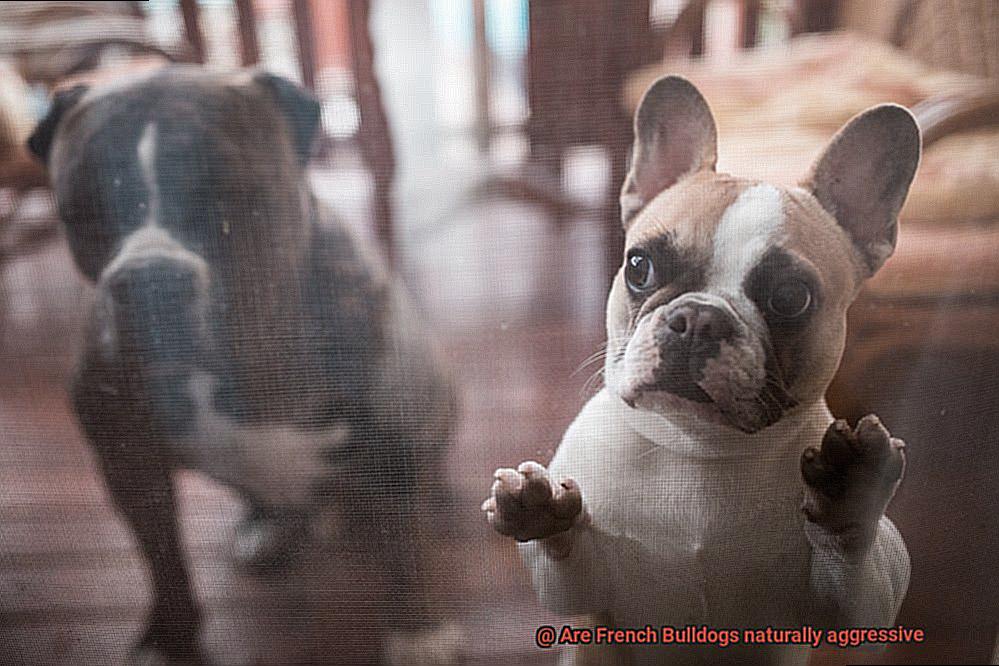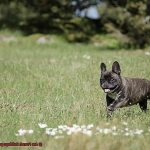Are French Bulldogs naturally aggressive?
You’re thinking about bringing home a French Bulldog, huh? Good choice. But hold up – before you dive headfirst into puppy cuddles and belly rubs, there’s something you need to know. People love to talk, and when it comes to Frenchies, one topic that always seems to come up is their supposed aggression. Are they really little balls of fury waiting to pounce? Well, let’s dig deep and get to the bottom of this doggie debate.
In this blog post, we’re going on a truth-seeking mission. We’ll explore what makes French Bulldogs tick and separate fact from fiction when it comes to their natural temperament. From their genes to how they were raised, we’ll leave no bone unturned in our quest for answers.
So buckle up and join us as we debunk the myths, analyze the evidence, and give you an honest-to-dog perspective on whether French Bulldogs are truly aggressive by nature.
It’s time to unleash the truth about these adorable four-legged friends once and for all.
The Genetics of French Bulldogs
Contents
- 1 The Genetics of French Bulldogs
- 2 The Role of Socialization in French Bulldog Behavior
- 3 Training French Bulldogs for Non-Aggressive Behavior
- 4 The Impact of Environment on French Bulldog Temperament
- 5 Signs That a French Bulldog Is Becoming Aggressive
- 6 How to Prevent Aggression in French Bulldogs
- 7 Common Misconceptions About Aggression in French Bulldogs
- 8 Conclusion
However, there is a common misconception that they are naturally aggressive dogs. In this article, we will delve into the genetics of French Bulldogs and explore how breeding practices can influence aggression levels. We’ll also provide valuable insights for French Bulldog owners to ensure a well-adjusted and friendly companion.
Genetics and Breeding Practices:
French Bulldogs were originally bred as companion dogs, and their friendly and sociable nature has been selectively bred for over the years. However, with the rise in popularity of this breed, irresponsible breeding practices have emerged. Some breeders prioritize appearance over temperament and health, leading to a higher likelihood of aggression in puppies.
Selecting a Responsible Breeder:
To ensure you bring home a French Bulldog with a stable temperament, it is crucial to choose a reputable breeder who prioritizes the well-being and temperament of their dogs. A responsible breeder will conduct health tests on their breeding dogs and carefully select mating pairs to minimize the risk of aggression or other behavioral issues. Researching the lineage of any dog you consider adopting or purchasing is essential, as dogs with a history of aggression in their bloodline may be more prone to displaying aggressive tendencies themselves.
The Role of Environment and Upbringing:
While genetics can play a role in determining a dog’s predisposition to aggression, it is important to remember that environment and upbringing also significantly impact behavior. Proper socialization, training, and consistent positive reinforcement are key factors in shaping a French Bulldog’s temperament. By exposing them to various people, animals, and environments from an early age, you can help develop their social skills and prevent fear or anxiety-based aggression.
Addressing Aggressive Behavior:
It is worth noting that not all aggressive behaviors displayed by French Bulldogs are solely due to genetics. Aggression can also be a result of fear, anxiety, or lack of proper socialization. Therefore, it is crucial to address any aggressive behavior promptly and seek the guidance of a professional dog trainer or behaviorist if needed.
The Role of Socialization in French Bulldog Behavior

If you’re the proud owner of a French Bulldog, you know that they are lovable and affectionate companions. But did you know that their behavior can be influenced by socialization? Let’s dive into the importance of socialization in shaping your Frenchie’s behavior, and how you can ensure they grow up to be friendly and well-adjusted dogs.
What is Socialization?
Socialization is the process of exposing your dog to various people, animals, environments, and experiences in a positive and controlled manner. This helps them develop social skills, adaptability, and confidence in different situations. For French Bulldogs, proper socialization is crucial to prevent fear or anxiety-driven behavior.
People: The More, The Merrier.
French Bulldogs are known for their friendly and sociable nature. To ensure they remain that way, it’s important to expose them to a variety of people. This includes children, men, women, and individuals of different ethnicities. By doing so, you’ll help your Frenchie become comfortable with different types of humans and reduce the likelihood of fear or aggression towards certain individuals.
Animal Encounters: Play Nice with Others
French Bulldogs can get along well with other dogs and even other pets if properly socialized. It’s important to introduce them to well-behaved dogs of various sizes and breeds. This will teach them appropriate behavior around other animals and prevent potential aggression towards them. Additionally, exposing your Frenchie to cats or small animals can help them learn how to peacefully coexist with them.
Exploring New Environments: The World is Their Playground
French Bulldogs have a curious nature and love exploring new places. Gradually introducing them to different environments such as parks, busy streets, public transportation, and different types of surfaces is essential for their socialization. This helps them become confident and adaptable in different surroundings, reducing the likelihood of fear-based aggression.
Positive Reinforcement: A Little Treat Goes a Long Way
Training your Frenchie with positive reinforcement methods is key to successful socialization. Reward-based training helps them associate positive experiences with new people, animals, and environments. This encourages them to approach new situations with a calm and confident demeanor.
Consistency is Key
Remember, socialization is an ongoing process that should continue throughout your Frenchie’s life. Regular exposure to different stimuli should be incorporated into their daily routine.
By doing so, you’ll help maintain their friendly and affectionate nature.
Training French Bulldogs for Non-Aggressive Behavior
French Bulldogs are known for their charming personalities and affectionate nature. However, like any other breed, they can display aggressive behavior if not properly trained and socialized.
Training French Bulldogs for non-aggressive behavior is crucial to ensure a well-behaved and balanced dog. In this article, we will explore the importance of training French Bulldogs for non-aggressive behavior and provide practical tips to help you achieve this goal.
Start Early:
Training your French Bulldog from a young age is essential. Early socialization and obedience training are crucial for their development. Begin by teaching basic commands such as sit, stay, come, and leash manners. Consistency and positive reinforcement are key in training French Bulldogs. Make use of treats, praise, and play to motivate your Frenchie and reinforce good behavior.
Avoid Punishment-Based Techniques:
It is important to note that punishment-based training techniques should be avoided as they can lead to fear or aggression in French Bulldogs. Instead, opt for reward-based training methods. This approach helps build a positive association with training and encourages your Frenchie to repeat desirable behaviors.
Provide Mental Stimulation:
French Bulldogs are intelligent dogs that require mental stimulation to prevent boredom and reduce the chances of aggression. Incorporate puzzle toys and interactive games into their daily routine to keep their minds engaged. This will not only help them learn new skills but also provide an outlet for their energy.
Socialize Your Frenchie:
Proper socialization is crucial for French Bulldogs to learn appropriate behaviors in different situations. Expose them to different people, animals, and environments from a young age. This will help them feel comfortable and confident in various settings, reducing the likelihood of fearful or aggressive behavior.
Seek Professional Help if Needed:
While training your French Bulldog for non-aggressive behavior may seem straightforward, some dogs may require additional guidance. Consider attending obedience classes or hiring a professional trainer specializing in French Bulldogs. They can provide you with specific training techniques tailored to their unique needs.
Conclusion:
Training French Bulldogs for non-aggressive behavior is essential for a harmonious relationship between you and your furry companion. By starting early, using positive reinforcement, providing mental stimulation, and proper socialization, you can ensure your Frenchie grows into a well-behaved and friendly dog. Remember to be patient and consistent in your training efforts and seek professional help if needed. With the right approach, you can enjoy the company of a happy and non-aggressive French Bulldog for years to come.
The Impact of Environment on French Bulldog Temperament
French Bulldogs are known for their friendly and affectionate nature, but did you know that their temperament can be influenced by their environment? In this section, we will explore how the environment in which a French Bulldog is raised plays a significant role in shaping its temperament and behavior.
Socialization: The Key to a Well-Balanced French Bulldog
Just like humans, dogs need socialization to thrive in their surroundings. Exposing your French Bulldog to different people, animals, and environments from an early age helps them become confident and well-adjusted dogs. Lack of socialization or exposure to negative experiences can make a French Bulldog fearful or anxious, leading to aggressive behavior as a defensive response. So, make sure to introduce your furry friend to new experiences and provide plenty of positive interactions.
Creating a Safe and Secure Environment
A safe and secure environment is essential for a French Bulldog’s well-being. This includes ensuring they have a comfortable living space, regular exercise, mental stimulation, and a consistent routine. A calm and peaceful environment generally promotes relaxation and positive behavior. Consider factors such as noise level, temperature, and overall atmosphere when creating the perfect haven for your pup.
The Impact of Owner Behavior
Dogs are highly perceptive creatures and can pick up on their owner’s emotions. If you’re stressed or anxious, it can affect your French Bulldog’s behavior as well. So, it’s important to be mindful of your own behavior and provide a calm and positive atmosphere for your furry friend.
Training: Setting Boundaries and Encouraging Positive Behavior
Regular training using positive reinforcement techniques is essential in shaping a French Bulldog’s behavior. This helps establish boundaries and teaches them how to interact appropriately with people and other animals. Consistency is key here – make sure to set clear expectations for your pup and reward them for good behavior.
Signs That a French Bulldog Is Becoming Aggressive
French Bulldogs are known for their friendly and sociable nature, but like any other breed, they can display signs of aggression if not properly trained or socialized. As a responsible owner, it is crucial to be aware of these signs and take appropriate action to prevent any aggressive behavior from escalating. Here are some key signs to look out for:
- Increased Growling or Snarling: If your French Bulldog starts growling or snarling more frequently, it could be a warning sign that they are feeling threatened or uncomfortable in certain situations. This is their way of communicating their discomfort, and it should never be ignored.
- Biting or Nipping: French Bulldogs may resort to biting or nipping if they feel cornered or fearful. This behavior should never be taken lightly and requires immediate attention. Identifying the triggers that cause your dog to bite and implementing desensitization and positive reinforcement training techniques can help address this issue.
- Aggressive Body Language: Pay attention to your French Bulldog’s body language. Raised hackles, stiff body posture, or a fixed stare can indicate that the dog is feeling defensive or ready to attack. It is essential to intervene and remove the dog from the situation before any aggressive behavior occurs.
- Territorial Aggression: French Bulldogs can become possessive over their food, toys, or sleeping areas and show aggression towards anyone who approaches these items. Consistent training and establishing boundaries can help manage this behavior.
- Aggression Towards Other Animals: French Bulldogs may exhibit dominance or territorial behavior when encountering unfamiliar animals. Proper socialization from an early age can prevent aggressive tendencies towards other animals.
If you notice any sudden changes in behavior, such as increased aggression, it is important to address them promptly. Consulting with a professional dog trainer or behaviorist can provide guidance on how to manage and correct any aggressive behaviors.
Remember, aggression is not an inherent trait in French Bulldogs. It is a result of various factors, including genetics, upbringing, and environment. With proper training, socialization, and a loving home environment, French Bulldogs can be friendly and well-behaved companions.
How to Prevent Aggression in French Bulldogs
French Bulldogs are beloved pets known for their friendly and affectionate nature. However, like any dog breed, they can display aggression if not properly trained and socialized. In this article, we will explore the key factors in preventing aggression in French Bulldogs, including early socialization, positive reinforcement training, consistent boundaries, mental and physical stimulation, and creating a stress-free environment.
Early Socialization: Building Confidence and Friendliness
Early socialization is crucial in preventing aggression in French Bulldogs. By exposing them to different environments, people, and animals from a young age, you can ensure they feel comfortable and confident in various situations. Take them on walks to meet new people and let them interact with other dogs in controlled settings. Enroll them in puppy classes where they can learn to socialize with other puppies and receive positive reinforcement for good behavior.
Positive Reinforcement Training: Encouraging Good Behavior
Positive reinforcement training techniques are effective in teaching French Bulldogs appropriate behavior. Rewarding good behavior with treats, praise, and playtime will encourage them to repeat those behaviors. Use clicker training or verbal cues paired with rewards to reinforce desired actions like sitting or walking calmly on a leash. Consistency is key – always reward good behavior immediately to reinforce the connection between the action and the reward.
Consistent Boundaries: Establishing Structure
Consistency is crucial when it comes to training a French Bulldog. Establish clear rules and boundaries and enforce them consistently. Inconsistency can confuse the dog and lead to frustration and potential aggression. For example, if jumping on furniture is not allowed, never allow it sometimes but not others. Instead, redirect their attention to a designated spot where they can relax comfortably.
Mental and Physical Stimulation: Channeling Energy Positively
Providing mental and physical stimulation is important for preventing aggression in French Bulldogs. Engage your furry friend in regular exercise, such as walks or playtime, to release their energy in a positive way. Puzzle toys and interactive games can also keep their minds stimulated and prevent boredom-induced aggression. Make sure to provide them with stimulating toys or treat-dispensing puzzles to keep them occupied when you’re not around.
Stress-Free Environment: Creating a Calm Atmosphere
Creating a calm and stress-free environment is essential for preventing aggression in French Bulldogs. Avoid exposing them to loud noises, chaotic situations, or stressful environments that may trigger aggressive behavior. Provide a designated quiet space where they can retreat and relax when they need downtime. Additionally, supervise interactions with children and other pets until your French Bulldog has shown consistent positive behavior.
Common Misconceptions About Aggression in French Bulldogs
When it comes to aggression in French Bulldogs, there are several misconceptions that need to be addressed. Let’s debunk these myths and provide accurate information about this beloved breed.
Appearance does not determine temperament
French Bulldogs may have a muscular build and stocky frame, but this does not make them inherently aggressive. Physical appearance alone cannot predict a dog’s behavior or aggression levels. It’s crucial to judge each dog based on its individual personality and upbringing.
French Bulldogs are great with children
Contrary to popular belief, French Bulldogs are typically gentle and patient with children. Their protective nature makes them excellent family pets. While they may be cautious around unfamiliar children, this is a normal behavior for any dog breed. With proper socialization, French Bulldogs can be wonderful companions for families.
Breed history does not define aggression
French Bulldogs do have a history as bull-baiting dogs, but it’s important to understand that the breed has evolved significantly since then. Through careful breeding and socialization efforts, breeders have focused on creating a friendly and sociable temperament in French Bulldogs. It’s unfair to judge a dog based on its historical background.
Like any dog breed, lack of proper training and socialization can contribute to aggression in French Bulldogs. It is essential for owners to invest time and effort into training and socializing their dogs from a young age. This will help them develop confidence, learn appropriate behaviors, and prevent fear-based aggression.
Neutering/spaying does not guarantee elimination of aggression
While neutering or spaying can have various benefits for a dog’s behavior, it does not automatically eliminate signs of aggression. These procedures should be considered as part of responsible ownership but addressing any signs of aggression requires proper training and behavior modification techniques.
Differentiate between aggression and protective behavior
French Bulldogs, like any breed, can be protective of their families and territory. This does not mean they are aggressive. It’s important to understand the context and differentiate between warning signs such as barking or growling and actual aggressive behavior. Positive reinforcement training methods can help address any underlying issues.
U9FfZtV10_Y” >
Conclusion
In conclusion, it is important to dispel the misconception that French Bulldogs are naturally aggressive.
These adorable little dogs may have a sturdy appearance, but their temperament is anything but hostile. In fact, they are known for their friendly and affectionate nature.
With the right approach, French Bulldogs can be well-behaved and gentle companions.




